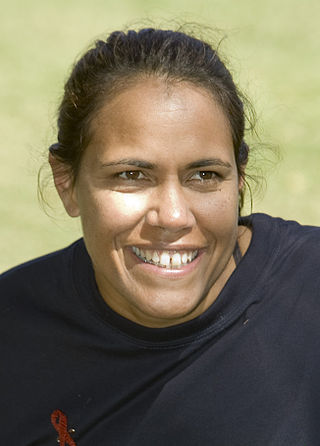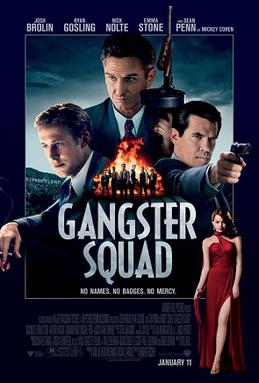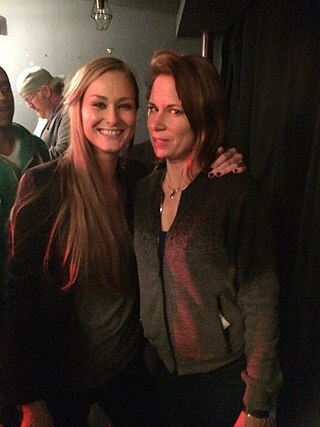
Catherine Astrid Salome Freeman is an Aboriginal Australian former sprinter, who specialised in the 400 metres event. Her personal best of 48.63 seconds currently ranks her as the ninth-fastest woman of all time, set while finishing second to Marie-José Pérec's number-four time at the 1996 Olympics. She became the Olympic champion for the women's 400 metres at the 2000 Summer Olympics, at which she had lit the Olympic Flame.

The cinema of Australia began with the 1906 production of The Story of the Kelly Gang, arguably the world's first feature film. Since then, Australian crews have produced many films, a number of which have received international recognition. Many actors and filmmakers with international reputations started their careers in Australian films, and many of these have established lucrative careers in larger film-producing centres such as the United States.

Archibald William Roach was an Australian singer-songwriter and Aboriginal activist. Often referred to as "Uncle Archie", Roach was a Gunditjmara and Bundjalung elder who campaigned for the rights of Aboriginal and Torres Strait Islander people. His wife and musical partner was the singer Ruby Hunter (1955–2010).

Wrong Side of the Road is a 1981 low-budget feature film made in South Australia. It is distinctive for being one of the first attempts to bring modern Australian Aboriginal music to a non-Indigenous audience, featuring all-Aboriginal rock reggae bands No Fixed Address and Us Mob.

Ruby Charlotte Margaret Hunter, also known as Aunty Ruby, was an Aboriginal Australian singer, songwriter and guitarist, and the life and musical partner of Archie Roach.

The Last Wave is a 1977 Australian mystery drama film directed by Peter Weir. It is about a white solicitor in Sydney whose seemingly normal life is disrupted after he takes on a murder case and discovers that he shares a strange, mystical connection with the small group of local Aboriginal people accused of the crime.

Richard Joseph Frankland is an Australian playwright, scriptwriter and musician. He is an Aboriginal Australian of Gunditjmara origin from Victoria. He has worked significantly for Aboriginal Australian causes.
Luke Carroll is an Australian stage, television, and film actor. He is known for his role in the television drama The Alice (2005), and as a host of the children's program Play School.

Rachel Perkins is an Indigenous Australian film and television director, producer, and screenwriter. She founded and was co-director of the independent film production company Blackfella Films from 1992 until 2022. Perkins and the company were responsible for producing First Australians (2008), an award-winning documentary series that remains the highest-selling educational title in Australia, and which Perkins regards as her most important work. She directed the films Radiance (1998), One Night the Moon (2001), Bran Nue Dae (2009), the courtroom drama telemovie Mabo (2012), and Jasper Jones (2017). The acclaimed television drama series Redfern Now was made by Blackfella Films, and Perkins directed two episodes as well as the feature-length conclusion to the series, Promise Me (2015).
No Way to Forget is an Australian short film. It is written and directed by Richard Frankland, produced by John Foss and stars David Ngoombujarra in the lead role as SHANE FRANCIS. It is the first film by an indigenous director to win an AFI Award. It was broadcast nationally on SBS TV. It screened at the 1996 Cannes Film Festival in the category of Un Certain Regard.

Leah Flanagan is an Australian singer-songwriter and arts administrator from Darwin, Northern Territory. based in Sydney. She has released several albums and has toured Australia with her music and as a part of festival ensembles.
The 2010 Deadly Awards were hosted by Luke Carroll and Naomi Wenitong at the Sydney Opera House on 27 September 2010. Performers included Archie Roach, Dan Sultan, Christine Anu, Frank Yamma, Ali Mills and the Bangarra Dance Theatre. The Awards program will be broadcast on SBS and SBS Two on 3 and 6 October respectively. The awards event was an annual celebration of Australian Aboriginal and Torres Strait Islander achievement in music, sport, entertainment and community.

Gangster Squad is a 2013 American action thriller film directed by Ruben Fleischer and written by Will Beall, based on a non-fiction book by Paul Lieberman. The film stars Josh Brolin, Ryan Gosling, Nick Nolte, Emma Stone, Anthony Mackie, Giovanni Ribisi, Robert Patrick, Michael Peña and Sean Penn. Set in 1949, a group of real-life LAPD officers and detectives called the Gangster Squad are assigned to bring down crime kingpin Mickey Cohen.

Redfern Now is an Australian drama television series featuring the lives of Aboriginal Australian families living in Redfern, Sydney, that first aired on ABC1 in 2012. A second season followed in 2013, and the series concluded with a feature-length telemovie, Redfern Now: Promise Me, in April 2015. The series' release contributed to widespread public debate surrounding Indigenous representation in the Australian media, and both series as well as the film were nominated for and won many awards.

Sarah Rachael Olivia Lawrence is an Australian model, comedian and TV personality. She is best known for her role in the Australian feature film Stone Bros.

The Nightingale is a 2018 Australian historical psychological thriller film written and directed by Jennifer Kent. The film stars Aisling Franciosi, Sam Claflin, Baykali Ganambarr, Damon Herriman, Harry Greenwood, Ewen Leslie, Charlie Shotwell, Michael Sheasby, and Magnolia Maymuru. Set in 1825 in Van Diemen's Land, it follows a young Irish convict (Franciosi) seeking vengeance against members of the Colonial forces of Tasmania who gang-raped her and killed both her husband and infant daughter. She is aided by an Aboriginal Tasmanian tracker (Ganambarr), who seeks vengeance for the British occupiers' Black War against his people.
Leon Burchill is an Australian actor. He played Charlie in Stone Bros., Frankie in Redfern Now and Benny in Wyrmwood. On stage he played Jim Krakouer in Krakouer! which toured in 2011.
Shane O'Mara is an Australian musician and record producer.
Steven McGregor is an Australian filmmaker, known for his work on Redfern Now, Black Comedy, Sweet Country, and numerous documentaries, including My Brother Vinnie.













